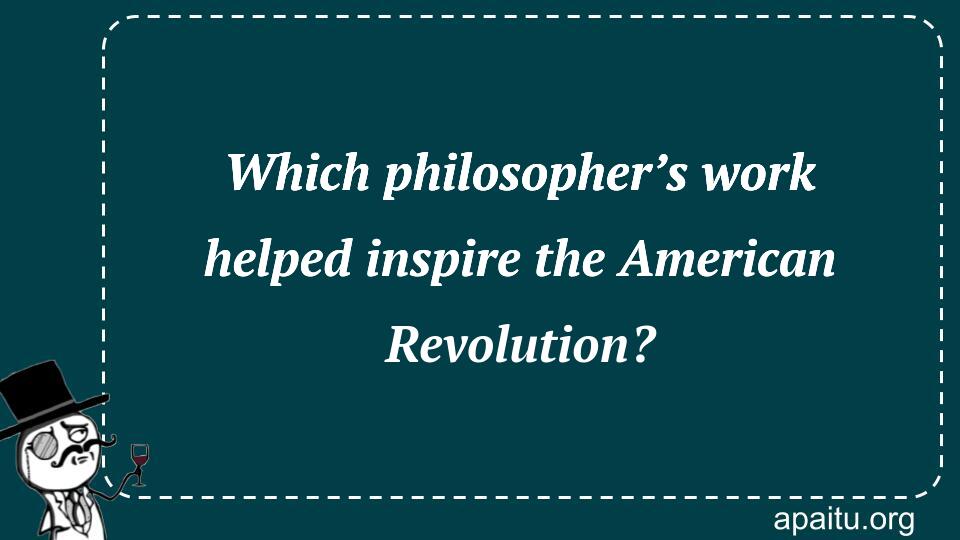Question
Here is the question : WHICH PHILOSOPHER’S WORK HELPED INSPIRE THE AMERICAN REVOLUTION?
Option
Here is the option for the question :
- John Locke
- Bertrand Russell
- Karl Marx
- Voltaire
The Answer:
And, the answer for the the question is :
Explanation:
John Locke was an English philosopher who lived from 1632 to 1704 and is most known for his groundbreaking ideas on political theory and individual freedom. His two most well-known articles, “Two Treatises of Government” and “Essay Concerning Human Understanding,” articulated the concepts that people are fundamentally free, have a responsibility to rebel against oppressive government, and have a fundamental human right to life, liberty, and property.

John Locke, a renowned philosopher of the 17th century, played a significant role in inspiring the ideals and principles that fueled the American Revolution. His writings on government, individual rights, and the social contract laid the foundation for a revolutionary shift in political thought, ultimately influencing the leaders and thinkers who sought independence from British rule.
Born on August 29, 1632, in Wrington, Somerset, England, John Locke was educated at the prestigious Westminster School and Oxford University. His philosophical works, particularly his influential treatises “Two Treatises of Government” and “An Essay Concerning Human Understanding,” profoundly impacted Enlightenment thinkers and American revolutionaries alike.
Locke’s “Two Treatises of Government,” published in 1690, presented a compelling argument against absolute monarchy and advocated for limited government and the protection of individual rights. In this work, Locke challenged the divine right of kings and asserted that political authority derives from the consent of the governed. He argued that governments exist to protect the natural rights of individuals, including life, liberty, and property.
Locke’s ideas resonated with the American colonists, who were increasingly dissatisfied with the oppressive policies of the British monarchy. His writings provided a philosophical justification for resistance to tyranny and the assertion of individual rights. Locke’s emphasis on the social contract, which posits that people willingly enter into a political society to secure their rights and liberties, provided a framework for justifying revolution against an unjust and oppressive regime.
The concept of natural rights, central to Locke’s philosophy, greatly influenced the American Revolutionaries. Thomas Jefferson, the primary author of the Declaration of Independence, drew heavily from Locke’s ideas when crafting the document. The famous words “life, liberty, and the pursuit of happiness” echo Locke’s notion of natural rights and the belief that governments exist to protect these inherent rights.
Furthermore, Locke’s ideas on the consent of the governed and the right to revolution resonated deeply with the American colonists. His argument that a government that fails to protect the natural rights of its citizens loses its legitimacy and can be overthrown provided a philosophical basis for the colonists’ grievances against British rule.
The influence of Locke’s philosophy extended beyond the Declaration of Independence. His ideas permeated the political discourse of the time, shaping the revolutionary ideals that guided the formation of the United States. The principles of limited government, separation of powers, and the protection of individual rights, which are enshrined in the U.S. Constitution and Bill of Rights, can be traced back to Locke’s theories.
Locke’s impact on the American Revolution was not limited to his political philosoph